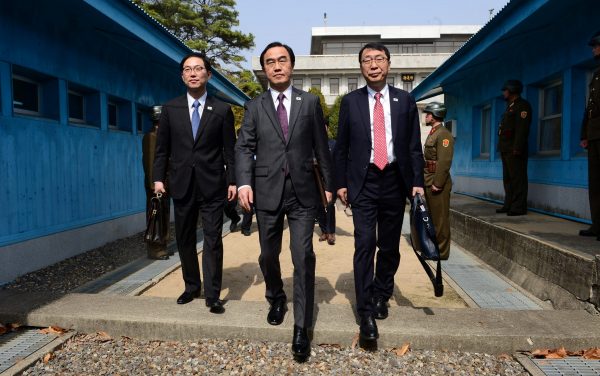The apparent olive branches extended from Kim to both Moon and Trump have led to popular speculation of an end to tensions on the Korean Peninsula and even expectations of negotiated progress towards North Korean denuclearisation. But without significant and irreversible demonstrations of sincerity on Pyongyang’s part, such optimism might end in disappointment.
The Moon administration was wise to accept a North–South summit as it ensures that North Korea will be on its best behaviour and not attempt missile launches, nuclear detonations or any other form of military adventurism in the near future. Yet even as the international community enjoys the easing of Korean tensions, it would be irrational to expect that these recent events signal a permanent change in Pyongyang’s policies.
North–South summit diplomacy makes for good publicity but little else.
The two previous North–South summits were held in 2000 and 2007 between former South Korean presidents Kim Dae-jung and Roh Moo-hyun respectively going to Pyongyang to meet with former North Korean leader Kim Jong-il. Roughly two years after the first summit, the United States detected that North Korea was secretly enriching uranium, violating the spirit of the 1994 Agreed Framework that froze North Korea’s nuclear program. This led to the collapse of the framework and increased tensions.
As for after the 2007 summit, Pyongyang’s second nuclear test in 2009 showed that Seoul–Pyongyang apex diplomacy does not leave a lasting impact on the Kim dynasty’s calculus. With this history in mind, South Korean President Moon Jae-in should think long and hard about how to maximise any returns from a summit with the North.
Unless North Korea is prepared to make sizeable and permanent concessions promoting peace on the Korean Peninsula, including denuclearisation, the upcoming Moon–Kim summit will only be a propaganda victory for Pyongyang. And while no serving US president has ever held a summit with any of the Kims, the evidence from past Seoul–Pyeongyang meetings does not support optimism regarding irreversible North Korean denuclearisation.
The history of arms negotiations with North Korea show that it is only willing to negotiate when it is subjected to significant economic duress and is seeking a way out of its predicament. So it would be counterproductive to ease pressure just when coercive measures are starting to bear fruit.
Two examples support this stand. First, when the Cold War ended, both Russia and China curtailed North Korean aid. This sent the North Korean economy into a tailspin. It had halved in size by 1999. When coupled with a series of natural disasters from 1995–97 that destroyed farmland and coal mines, the resulting famine killed 3 million people. These events encouraged Pyongyang to negotiate, and in September 1999 it agreed to a provisional moratorium on missile tests for a relaxation of US economic sanctions.
Second, in 2007 the US blacklisted the Macanese bank Banco Delta Asia, pressuring the bank into freezing US$25 million of North Korean funds due to money laundering charges. This deprived Kim Jong-il of a potential slush fund with which to ensure the loyalty of his generals and closed off avenues by which Pyongyang could access the international financial system, since Banco Delta Asia, along with other previously North Korean friendly banks, began to shun the North in order not to be shut off from the US financial system.
Consequently, the Kim regime was willing to negotiate a de-escalatory quid pro quo. In return for releasing Pyongyang’s frozen funds, supplying North Korea with fuel and delisting the North as a state sponsor of terrorism, Kim Jong-il froze North Korea’s nuclear program, demolished a cooling tower at its Yongbyon nuclear reactor and released nuclear program-related documents to Washington.
Since agreeing to insubstantial ‘progress’ on nuclear disarmament in return for relief from pressure is part of Pyongyang’s modus operandi, presidents Moon and Trump should exercise utmost circumspection towards the Kim regime’s diplomatic guile and steadfastly uphold denuclearisation sanctions along with the international community. Even as policy doves hope that a grand bargain can be struck either in the Moon–Kim or Trump–Kim summit, we should not count on Kim having a nuclear disarmament epiphany.
Now’s not the time to go wobbly on Pyongyang.
Liang Tuang Nah is a Research Fellow of the Military Studies Programme at the Institute of Defence and Strategic Studies, within the S Rajaratnam School of International Studies (RSIS), Nanyang Technological University.

